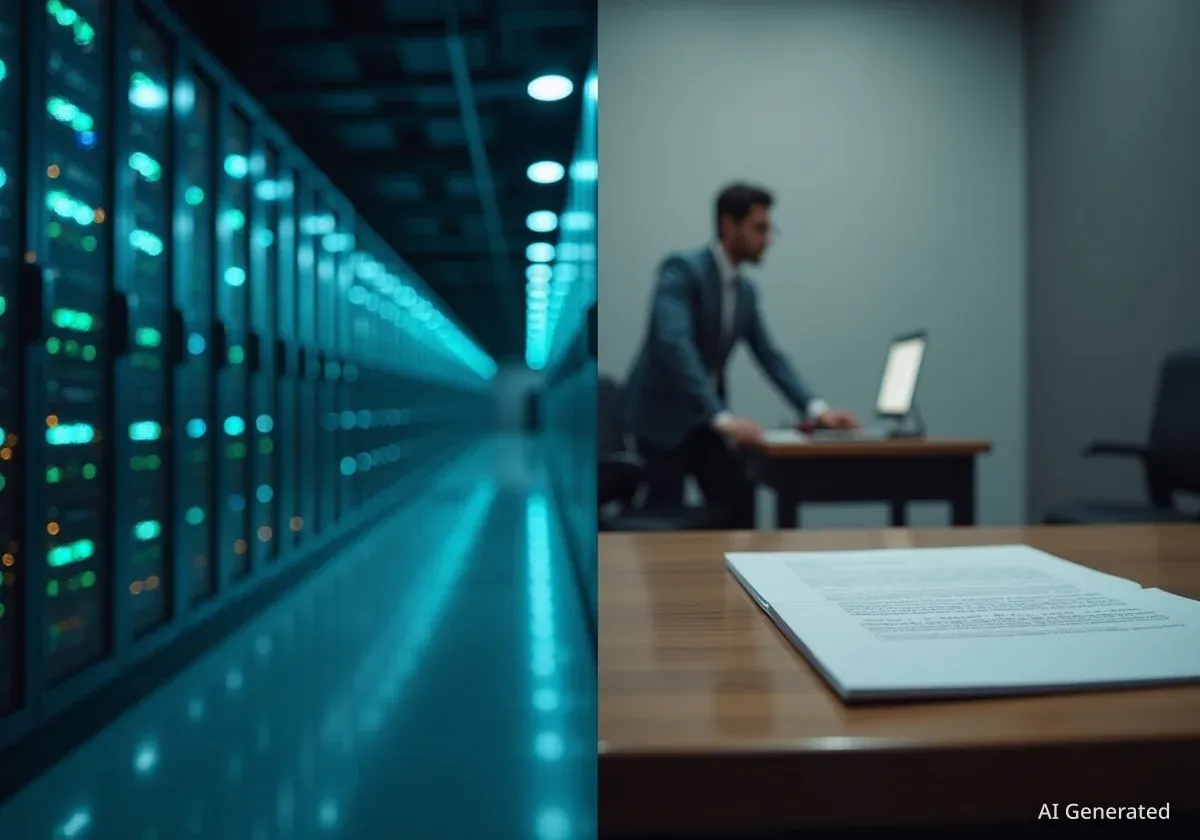Major developments in technology and policy have captured attention this week, led by NVIDIA's landmark $100 billion investment in OpenAI to expand AI data center infrastructure. The move coincides with a significant proposed policy shift from the Trump administration, introducing a $100,000 fee for H-1B visas, which has created uncertainty for tech companies and foreign workers. These events highlight the rapid pace of change in both the AI sector and U.S. immigration policy.
Key Takeaways
- NVIDIA has announced a $100 billion investment to build OpenAI data centers equipped with its proprietary chips, deepening their strategic partnership.
- Analysts are debating whether the massive scale of AI investments, exemplified by this deal, signals a market bubble or a sustainable technological revolution.
- The Trump administration proposed a new $100,000 fee for H-1B visas, a program crucial for the U.S. tech industry's access to global talent.
- The abrupt announcement of the visa fee has caused confusion and concern among businesses regarding implementation details and potential economic consequences.
- A separate incident involving a memecoin parody of the defunct energy company Enron illustrates the volatile and often unpredictable nature of the cryptocurrency market.
NVIDIA Commits $100 Billion to OpenAI Infrastructure
Chipmaker NVIDIA has solidified its central role in the artificial intelligence industry with a massive $100 billion investment in OpenAI. The funding is specifically allocated to the construction and outfitting of advanced data centers, which will form the backbone of OpenAI's future AI model development. This strategic move ensures that NVIDIA's specialized chips will power the next generation of AI services from one of the sector's leading companies.
The partnership is mutually beneficial. OpenAI gains access to a guaranteed supply of the most sought-after AI hardware, crucial for training increasingly complex models. For NVIDIA, the deal locks in a major customer and reinforces its market dominance, creating a high barrier to entry for competitors.
A Symbiotic Relationship
NVIDIA's GPUs (Graphics Processing Units) have become the industry standard for AI training and inference. OpenAI's high-profile models, like GPT-4 and its successors, were trained using tens of thousands of NVIDIA GPUs, demonstrating the deep reliance of AI software on specialized hardware.
Is This a Sign of an AI Bubble?
The sheer scale of the $100 billion investment has amplified discussions about a potential AI bubble. Some market analysts, including Bloomberg's Max Chafkin, suggest that such valuations and capital commitments are reminiscent of past tech booms that ended in market corrections. The argument is that current spending is based on future profit projections that may not materialize as expected.
Proponents of the investment, however, argue that the capital is necessary to build the foundational infrastructure for what they see as a transformative technology. They compare it to the build-out of the internet in the late 1990s, where massive initial investments were required before widespread profitability was achieved. According to this view, the spending reflects the real cost of pioneering a new technological era.
"When you see nine and ten-figure deals becoming commonplace, you have to ask if the valuations are grounded in current reality or future speculation. The line between a revolution and a bubble can be very thin," noted one market analyst in a recent discussion.
The debate centers on whether the current AI boom will generate enough economic value to justify these immense expenditures. While AI applications are growing, their path to widespread, sustainable profitability across all sectors is still being determined.
Trump Administration Announces $100,000 H-1B Visa Fee
In a move that sent shockwaves through the technology and business communities, the Trump administration announced its intention to impose a new $100,000 fee for each H-1B visa. The H-1B program is a non-immigrant visa that allows U.S. employers to temporarily employ foreign workers in specialty occupations, and it is a critical talent pipeline for the tech industry.
The proposed fee represents a dramatic increase from current costs, which typically range from a few thousand to several thousand dollars per application. The administration has framed the proposal as a way to prioritize American workers and ensure that companies are only hiring foreign talent for highly paid, essential roles.
The Role of the H-1B Visa
The H-1B visa program has an annual cap of 85,000 visas, with demand regularly exceeding supply. Tech companies like Google, Microsoft, and Amazon are among the top sponsors, using the program to hire skilled engineers, data scientists, and other specialists from a global talent pool. The program has long been a subject of political debate, with critics arguing it displaces American workers and supporters claiming it is essential for innovation and competitiveness.
Confusion and Chaos Following the Rollout
The announcement was reportedly made with few specific details about its implementation, leading to immediate confusion. Companies and immigration lawyers were left with critical unanswered questions, including:
- When would the new fee take effect?
- Would it apply to visa renewals and transfers, or only new applications?
- Are there any exemptions for smaller businesses or non-profit organizations?
This lack of clarity has created significant operational challenges for businesses that rely on the H-1B program for workforce planning. Many companies are now scrambling to assess the financial impact and re-evaluate their hiring strategies for the upcoming fiscal year. The uncertainty itself risks disrupting projects and slowing innovation as companies pause hiring decisions.
Potential Economic Impact on the Tech Sector
If implemented, the fee could fundamentally alter the hiring landscape. Large tech corporations might absorb the cost for top-tier talent, but smaller startups and mid-sized companies could be priced out of the global talent market. This could lead to a greater concentration of foreign talent at the largest firms and potentially push startups to explore offshore hiring models.
Economists are concerned that such a drastic change could make the U.S. less attractive for skilled professionals, who may choose to work in other countries with more favorable immigration policies, such as Canada or the United Kingdom. Over time, this could impact the long-term competitiveness of the U.S. technology industry.
Enron Parody Spirals into Memecoin Fiasco
In a separate development highlighting the often chaotic nature of digital finance, a project that began as a parody of the infamous energy company Enron devolved into a memecoin controversy. Max Chafkin of Bloomberg detailed how the initiative, intended as a satirical commentary on corporate greed, quickly attracted speculative interest from cryptocurrency traders.
The project reportedly issued a digital token, or memecoin, tied to the Enron parody theme. As is common in the highly volatile memecoin market, the token's value surged based on social media hype and speculative trading rather than any underlying utility or value. However, the situation quickly unraveled, leading to significant financial losses for many who had invested.
This incident serves as another cautionary tale about the risks associated with the unregulated and sentiment-driven memecoin market. While some see these tokens as a form of entertainment or social commentary, their potential for rapid and severe financial loss remains a significant concern for both investors and regulators.





